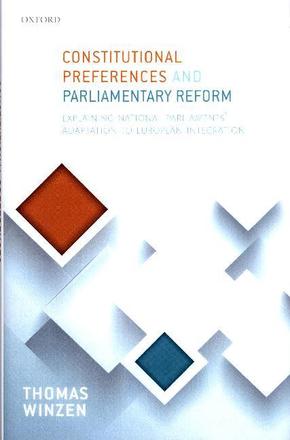
Constitutional Preferences and Parliamentary Reform - Explaining National Parliaments' Adaptation to European Integration
| Verlag | Oxford University Press |
| Auflage | 2017 |
| Seiten | 242 |
| Format | 16,0 x 24,0 x 1,8 cm |
| Print PDF | |
| Gewicht | 513 g |
| Artikeltyp | Englisches Buch |
| ISBN-10 | 0198793391 |
| EAN | 9780198793397 |
| Bestell-Nr | 19879339EA |
This book provides a comprehensive account of national parliaments' adaptation to European integration.
This book provides a comprehensive account of national parliaments' adaptation to European integration. Advancing an explanation based on political parties' constitutional preferences, the volume investigates the nature and variation of parliamentary rights in European Union affairs across countries and levels of governance. In some member states, parliaments have traditionally been strong and parties hold intergovernmental visions of European integration. In these countries, strong parliamentary rights emerge in the context of parties' efforts to realise their preferred constitutional design for the European polity. Parliamentary rights remain weakly developed where federally-oriented parties prevail, and where parliaments have long been marginal arenas in domestic politics. Moreover, divergent constitutional preferences underlie inter-parliamentary disagreement on national parliaments' collective rights at the European level. Constitutional preferences are key to understanding w hy a 'Senate' of national parliaments never enjoyed support and why the alternatives subsequently put into place have stayed clear of committing national parliaments to any common policies.
This volume calls into question existing explanations that focus on strategic partisan incentives arising from minority and coalition government. It, furthermore rejects the exclusive attribution of parliamentary 'deficits' to the structural constraints created by European integration and, instead, restores a sense of accountability for parliamentary rights to political parties and their ideas for the European Union's constitutional design.
Inhaltsverzeichnis:
1: Introduction
2: The Democratic Deficit and Parliamentary Adaptation to Integration
3: Constitutional Preferences and National Parliamentary Reform
4: Analyzing Domestic Adaptation to European Integration Empirically
5: Constitutional Preferences in Dutch Parliamentary Reform Debates, 1985-2010
6: The Lack of a Strong 'Direct' Parliamentary Role in EU Policy-Making
7: Thomas Winzen and Berthold Rittberger: Parliamentary Reactions to Reforms of Economic and Monetary Union
8: Potentials and Pitfalls of Building Parliament Rights on Constitutional Preferences
Appendix I: Additional Tables and Figures for Each Chapter
Appendix II: Data Sources
Rezension:
This volume will, beyond any doubt, be of great interest to anyone interested in parliamentary studies, and in democracy in general, in the EU. It covers ample ground in these fields in considering numerous aspects and in not focusing on a specific legislature, which is definitely a strong point of this monograph. It also successfully fills a gap in the existing literature in explaining the mobilization of national parliaments at domestic level despite their limited involvement at EU level, and is clear and well-written. Diane Fromage, JMCS
